- Home
- Elizabeth George
Elizabeth I
Elizabeth I Read online
Table of Contents
Title Page
Copyright Page
Dedication
Acknowledgements
Chapter 1
Chapter 2
Chapter 3
Chapter 4 - ELIZABETH
Chapter 5
Chapter 6
Chapter 7
Chapter 8
Chapter 9
Chapter 10
Chapter 11
Chapter 12 - LETTICE
Chapter 13 - ELIZABETH
Chapter 14
Chapter 15 - LETTICE
Chapter 16 - ELIZABETH
Chapter 17
Chapter 18
Chapter 19
Chapter 20
Chapter 21 - LETTICE
Chapter 22 - ELIZABETH
Chapter 23
Chapter 24
Chapter 25 - LETTICE
Chapter 26 - ELIZABETH
Chapter 27
Chapter 28
Chapter 29 - LETTICE
Chapter 30 - ELIZABETH
Chapter 31
Chapter 32 - LETTICE
Chapter 33 - ELIZABETH
Chapter 34
Chapter 35
Chapter 36
Chapter 37
Chapter 38 - LETTICE
Chapter 39 - ELIZABETH
Chapter 40
Chapter 41 - LETTICE
Chapter 42 - ELIZABETH
Chapter 43
Chapter 44 - LETTICE
Chapter 45
Chapter 46 - ELIZABETH
Chapter 47
Chapter 48 - LETTICE
Chapter 49
Chapter 50
Chapter 51 - ELIZABETH
Chapter 52
Chapter 53 - LETTICE
Chapter 54 - ELIZABETH
Chapter 55
Chapter 56
Chapter 57
Chapter 58
Chapter 59 - LETTICE
Chapter 60 - ELIZABETH
Chapter 61 - LETTICE
Chapter 62 - ELIZABETH
Chapter 63 - LETTICE
Chapter 64 - ELIZABETH
Chapter 65
Chapter 66
Chapter 67
Chapter 68
Chapter 69
Chapter 70 - LETTICE
Chapter 71
Chapter 72 - ELIZABETH
Chapter 73
Chapter 74 - LETTICE
Chapter 75 - ELIZABETH
Chapter 76 - LETTICE
Chapter 77 - ELIZABETH
Chapter 78
Chapter 79 - LETTICE
Chapter 80
Chapter 81 - ELIZABETH
Chapter 82
Chapter 83
Chapter 84
Chapter 85 - LETTICE
Chapter 86
Chapter 87 - ELIZABETH
Chapter 88
Chapter 89 - LETTICE
Chapter 90 - ELIZABETH
Chapter 91
Chapter 92
Chapter 93
Chapter 94
Chapter 95
Chapter 96
EPILOGUE
AFTERWORD
ALSO BY MARGARET GEORGE
The Autobiography of Henry VIII
Mary Queen of Scotland and the Isles
The Memoirs of Cleopatra
Mary, Called Magdalene
Helen of Troy
Lucille Lost (children’s book)
VIKING
Published by the Penguin Group
Penguin Group (USA) Inc., 375 Hudson Street, New York, New York 10014, U.S.A. • Penguin Group (Canada), 90 Eglinton Avenue East, Suite 700, Toronto, Ontario, Canada M4P 2Y (a division of Pearson Penguin Canada Inc.) • Penguin Books Ltd, 80 Strand, London WC2R 0RL, England • Penguin Ireland, 25 St. Stephen’s Green, Dublin 2, Ireland (a division of Penguin Books Ltd) • Penguin Books Australia Ltd, 250 Camberwell Road, Camberwell, Victoria 3124, Australia (a division of Pearson Australia Group Pty Ltd) • Penguin Books India Pvt Ltd, 11 Community Centre, Panchsheel Park, New Delhi—110 017, India • Penguin Group (NZ), 67 Apollo Drive, Rosedale, North Shore 0632, New Zealand (a division of Pearson New Zealand Ltd) • Penguin Books (South Africa) (Pty) Ltd, 24 Sturdee Avenue, Rosebank, Johannesburg 2196, South Africa
Penguin Books Ltd, Registered Offices: 80 Strand, London WC2R 0RL, England
First published in 2011 by Viking Penguin, a member of Penguin Group (USA) Inc.
Copyright © Margaret George, 2011 All rights reserved
Publisher’s Note
This is a work of fiction. Names, characters, places, and incidents either are the product of the author’s imagination or are used fictitiously, and any resemblance to actual persons, living or dead, business establishments, events, or locales is entirely coincidental.
LIBRARY OF CONGRESS CATALOGING IN PUBLICATION DATA
George, Margaret.
Elizabeth I : a novel / Margaret George. p. cm.
Includes bibliographical references.
eISBN : 978-1-101-47625-3
1. Elizabeth I, Queen of England, 1533-1603—Fiction. 2. Great Britain—History—Elizabeth, 1558-1603—Fiction. 3. Queens—Great Britain—Fiction. I. Title.
PS3557.E49E65 2011
813’.54—dc22 2010035382
Without limiting the rights under copyright reserved above, no part of this publication may be reproduced, stored in or introduced into a retrieval system, or transmitted, in any form or by any means (electronic, mechanical, photocopying, recording or otherwise), without the prior written permission of both the copyright owner and the above publisher of this book.
The scanning, uploading, and distribution of this book via the Internet or via any other means without the permission of the publisher is illegal and punishable by law. Please purchase only authorized electronic editions and do not participate in or encourage electronic piracy of copyrightable materials. Your support of the author’s rights is appreciated.
http://us.penguingroup.com
For Robert,
My son-in-law,
A loyal subject of
Her Majesty Queen Elizabeth
Past and Present
THANKS AND ACKNOWLEDGMENTS
As always, family—my husband Paul, daughter Alison, son-in-law Robert, sister Rosemary—were supportive and helpful, and my agent Jacques de Spoelberch and editors Carolyn Carlson and Beena Kamlani made the book shine brighter after it came into their hands. I want to thank Professor William Aylward, Classics Department, University of Wisconsin-Madison, for his help in Latin translations, Dr. Mary Magray, Irish historian and lecturer, Department of Liberal Studies and the Arts, University of Wisconsin-Madison, for her knowledge and help with the intricacies of Irish history in Elizabeth’s period, and my friend Miki Knezevic for thoughtful ideas about the characters. Dr. Lynn Courtenay and Dr. Nathaniel Alcock ferreted out the exact wording on the Dudley family tomb in Warwick, invaluable help for the story. My father, Scott George, first told me about Old Parr when he looked for his grave in Westminster Abbey. The friendship and support of my SCC sisters—Lola Barrientos, Patsy Evans, Chris Thomas, Beverly Resch, Mary Sams, Diane Hager, and Margaret Harrigan—over the years has meant a great deal to me. And finally, my thanks to fellow Elizabethans Jerry and Nancy Mitchell, who appeared one night at Hatfield House and made the banquet magical.
And the spirit of Elizabeth herself, I believe, hovered over the book as it was taking shape and whispered her guidance.
ARCHBISHOP CRANMER:
In her days every man shall eat in safety,
Under his own vine, what he plants; and sing
The merry songs of peace to all his neighbours:
God shall be truly known; and those about her
From her shall read th
e perfect ways of honour,
And by those claim their greatness, not by blood.
...
She shall be, to the happiness of England,
An aged princess; many days shall see her,
And yet no day without a deed to crown it.
Would I had known no more! But she must die,
She must, the saints must have her; yet a virgin,
A most unspotted lily shall she pass
To th’ ground, and all the world shall mourn her.
KING HENRY VIII:
O Lord Archbishop,
Thou hast made me now a man. Never before
This happy child did I get anything.
This oracle of comfort has so pleas’d me
That when I am in heaven I shall desire
To see what this child does, and praise my Maker.
—William Shakespeare, Henry VIII, V, iv: 33-38; 56-68
1
The Vatican, March 1588
Felice Peretti, otherwise known as Pope Sixtus V, stood swaying before the stack of rolled Bulls.
They were neatly arranged like a cord of wood, alternating short and long sides, their lead seals hanging down like a row of puppy tails.
“Ah,” he said, eyeing them with great satisfaction. They seemed to radiate power. But one thing was lacking: his blessing.
Raising his right hand, he spoke in sonorous Latin: “O sovereign God, hear the prayer of your servant Sixtus. Acting in accordance with my office as the vicar of Christ, his representative on earth, who has the power to bind and loose, to forgive sins or withhold forgiveness, I have pronounced judgment on that wicked woman of England, the pretender queen. She is hereby excommunicated from the body of Christendom until such time as she repents. In order that those living under her rule do not go down into damnation with her, we bless the Enterprise of England. Aboard the ships of the great Armada will go these Bulls of excommunication and sentence upon Elizabeth, the pretender queen of England, calling for her deposition, in order that her subjects may be rescued from her impiety and perverse government. They will see the happy light of day when Christ’s avengers set boots upon English soil. There they will be distributed to the faithful. Merciful God, we ask this in the savior’s name, and for his Holy Church.”
The sixty-eight-year-old pope then slowly circled the pile, making the sign of the cross and sprinkling it with holy water. Then he nodded to the Spanish envoy standing quietly to one side.
“You may transport them now,” he said. “The Armada leaves from Lisbon, does it not?”
“Yes, Your Holiness. Next month.”
Sixtus nodded. “They should arrive in plenty of time, then. You have waterproof canisters for them?”
“I am sure they will be provided. King Philip thinks of everything.”
2
The South Coast, England, April 1588
The old hermit shuffled out of his shelter, as he did every morning.
He made his bed in the ruins of St. Michael’s Chapel, perched near the peak of a jutting piece of headland stretching out into Plymouth Sound. He stood on the rim of the cliff, the ocean far below him, his eyes darting left and right, searching. The morning sun, glinting off the water, made it hard to see. He shaded his eyes and squinted, trying to detect the telltale shape of sails on the horizon. Nothing. Not today.
Muttering, he turned to attend to his other business—preparing the beacon. He had found an abandoned dolmen, an ancient monument, at the pinnacle of the peak and had been carrying twigs, straw, and kindling there for days. The fire that would flare out from the cone-shaped mounted brackets must be visible for miles, until the next beacon. And this was likely the first. This would be the place, if any place, that the Armada would first come into view. And he, the hermit of St. Michael’s, would keep vigilant watch as long as there was a whisper of light to see by.
He patted the dolmen. Pagan stuff. Made long ago by vanished people. But who cared, if it helped in the fight against the Spanish enemy?
3
The Tower of London, May 1588
Quiet!” Philip Howard motioned to the priest.
Someone was coming. The guard was making his rounds. His footstep on the stones outside was a sound that Philip heard even in his dreams. He bent his head down, resting it between his knees, his hands hanging limply. He must look asleep. The priest did likewise, drawing his cloak up around himself. The others in the room fell silent, turned to stone.
The footsteps paused; the shutter over the iron grille in the prisoners’ door lifted. Then it clanged down again, and the footsteps continued.
Philip stayed still for another few minutes to be safe. Finally he whispered, “He’s gone. He won’t make rounds again for two or three hours. Let’s begin. Let’s begin God’s work.”
The others in the chamber stirred. The priest threw back the covering on his head. “In the name of the Holy Mother Church,” he said, “I will perform this Mass.”
Philip shook his head. “It must be dedicated to another intention,” he said. “I was not a traitor until they sought to make me one. Now, held for five years here in the Tower, I have seen the evil of the queen and her so-called church firsthand. It must perish. She must perish. And my godfather King Philip will ensure that.”
In the dim light the priest’s eyes glittered. “And who will the Mass be dedicated to?” he asked.
“To the success of the Armada!” said Philip. “May it wreak revenge on this godless nation!”
“To the success of the Armada,” the others intoned.
The priest began laying out his holy implements, an earthenware cup for a chalice, a wooden saucer for a paten, a rough scarf for a stole. “Let us pray,” he began.
“O most high, you have looked down in sorrow upon the blasphemy and sacrilege here in England, once your obedient servant, now a renegade. As of old, when a nation went a-whoring after false gods, you used a rod to chastise them, you now send your son, King Philip of Spain, a devotee of the True Faith, to smite them. Just as there was no mercy for the Amorites or the Philistines or the Canaanites, there can be no mercy for these straying people. If we perish alongside them, we are willing. Look what your servant Philip, Earl of Arundel, has carved here on the wall of his miserable prison. See his fine words: Quanto plus afflictionis pro Christo in hoc saeculo, tanto plus gloriae cum Christo in futuro—The more affliction we endure for Christ in this world, the more glory we shall obtain with Christ in the next. We know, O Lord, that that is true.”
“True ... true ... true ...,” murmured Philip and his companion prisoners. “O Armada, come quickly to deliver England! Bless all her exiled sons who are aboard, taking up arms to deliver their homeland!”
Their heated cries echoed within the dank stone chamber.
4
ELIZABETH
May 1588
The whip cracked and snapped as it sought its victim.
I could see the groom cowering in the bushes, then crawling away in the underbrush as the whip ripped leaves off a branch just over his head. A stream of Spanish followed him, words to the effect that he was a worthless wretch. Then the face of the persecutor turned toward me, shining with his effort. “Your Majesty,” he said, “why do you keep my whip?”
It was a face I had thought never to see again—that of Don Bernardino de Mendoza, the Spanish ambassador I had evicted from England four years earlier for spying. Now he rounded on me and began fingering his whip as he walked toward me.
I sat up in bed. I could still smell the leather of the whip, lingering in the air where it had cracked. And that smirk on the face of Mendoza, his teeth bared like yellowed carved ivory—I shuddered at its cold rictus.
It was only a dream. I shook my head to clear it. The Spanish were much on my mind, that was all. But ... didn’t Mendoza actually leave me a whip? Or did we just find one in his rooms after he hurriedly left? I had it somewhere. It was smaller than the one in the dream, useful only for urging horses, not punishing hors
e grooms. It had been black, and braided, and supple as a cat’s tail. Spain’s leather was renowned for its softness and strength. Perhaps that was why I had kept it.
It was not light out yet. Too early to arise. I would keep my own counsel here in bed. Doubtless devout Catholics—secretly here in England, openly in Europe—were already at early Mass. Some Protestants were most likely up and studying Scripture. But I, their reluctant figurehead, would commune with the Lord by myself.
I, Elizabeth Tudor, Queen of England for thirty years, had been cast by my birth into the role of defender of the Protestant faith. Spiteful people said, “Henry VIII broke with the pope and founded his own church only so he could get his way with Anne Boleyn.” My father had given them grounds with his flip quote “If the pope excommunicates me, I’ll declare him a heretic and do as I please.” Thus the King’s Conscience had become a joke. But out of it had come the necessity of embracing Protestantism, and from that had grown a national church that now had its own character, its own martyrs and theology. To the old Catholic Church, I was a bastard and usurper queen; thus I say that my birth imposed Protestantism upon me.
Why must England, a poor country, be stuck with subsidizing three others—the French, the Dutch, the Scots—and facing Spain, the Goliath champion of Catholicism? God’s teeth, wasn’t it enough for me to defend and manage my own realm? The role was a sponge that soaked up our resources and was driving us slowly but inexorably toward bankruptcy. To be the soldier of God was an expense I could have done without.
Soldier. God must be laughing, to have handed me his banner to carry, when all the world knew—or thought it did—that a woman could never lead troops into battle.
Mendoza ... His face still haunted me, as if the dream clung inside my head. His black, searching eyes and snake-thin face, his shiny skin and receding hairline—if he was not a villain, he looked like one. He had plotted and spied here in England, until he was exposed and expelled. His last words upon boarding were “Tell your mistress that Bernardino de Mendoza was born not to disturb kingdoms but to conquer them.” Since then he had settled in Paris as King Philip’s ambassador, creating a web of espionage and intrigue that spread across all Europe.

 Well-Schooled in Murder
Well-Schooled in Murder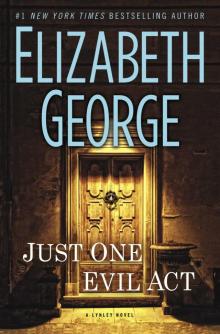 Just One Evil Act
Just One Evil Act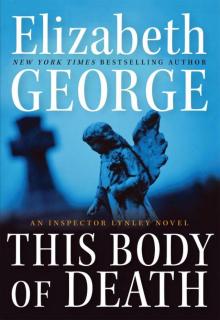 This Body of Death
This Body of Death The Edge of the Water
The Edge of the Water For the Sake of Elena
For the Sake of Elena Believing the Lie
Believing the Lie The Edge of the Shadows
The Edge of the Shadows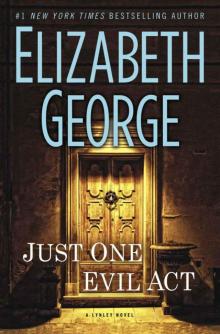 Just One Evil Act: A Lynley Novel
Just One Evil Act: A Lynley Novel In Pursuit of the Proper Sinner
In Pursuit of the Proper Sinner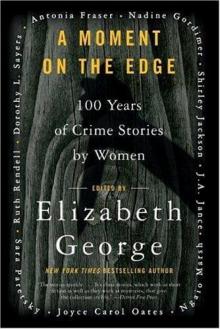 A Moment on the Edge:100 Years of Crime Stories by women
A Moment on the Edge:100 Years of Crime Stories by women Elizabeth I
Elizabeth I I, Richard
I, Richard A Traitor to Memory
A Traitor to Memory Missing Joseph
Missing Joseph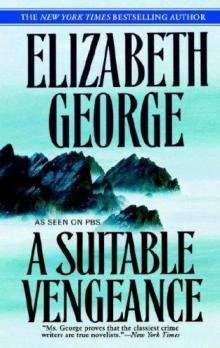 A Suitable Vengeance
A Suitable Vengeance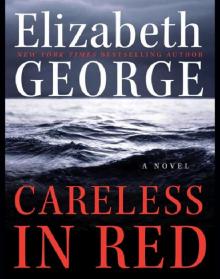 Careless in Red
Careless in Red A Banquet of Consequences
A Banquet of Consequences Playing for the Ashes
Playing for the Ashes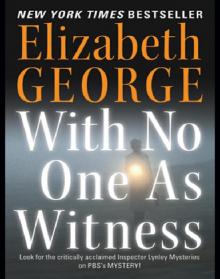 With No One As Witness
With No One As Witness Deception on His Mind
Deception on His Mind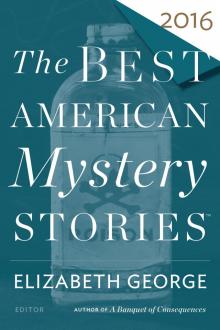 The Best American Mystery Stories 2016
The Best American Mystery Stories 2016 A Great Deliverance
A Great Deliverance In the Presence of the Enemy
In the Presence of the Enemy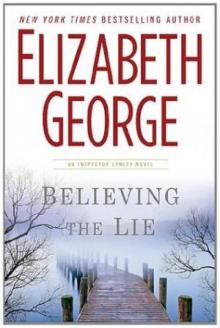 Believing the Lie il-17
Believing the Lie il-17 The Edge of the Light
The Edge of the Light SW01 - The Edge of Nowhere
SW01 - The Edge of Nowhere A Place of Hiding
A Place of Hiding What Came Before He Shot Her il-14
What Came Before He Shot Her il-14 Payment In Blood
Payment In Blood The Punishment She Deserves
The Punishment She Deserves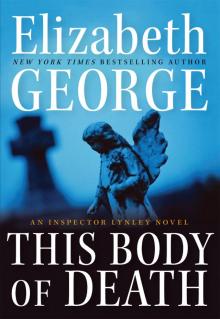 This Body of Death: An Inspector Lynley Novel
This Body of Death: An Inspector Lynley Novel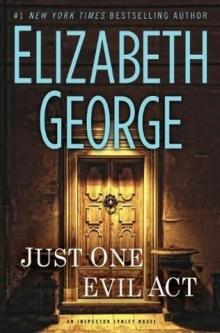 Just One Evil Act il-18
Just One Evil Act il-18 What Came Before He Shot Her
What Came Before He Shot Her Missing Joseph il-6
Missing Joseph il-6